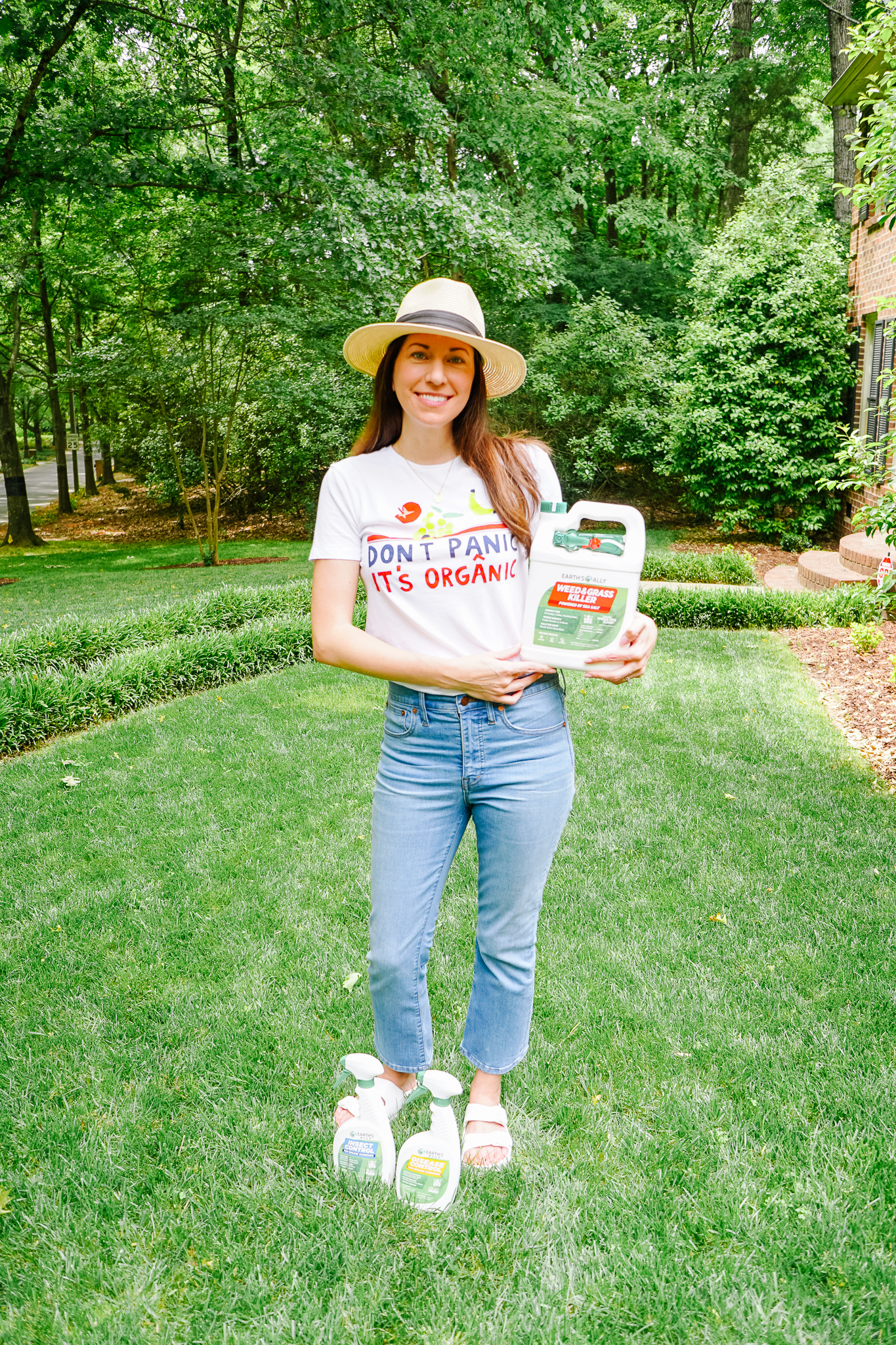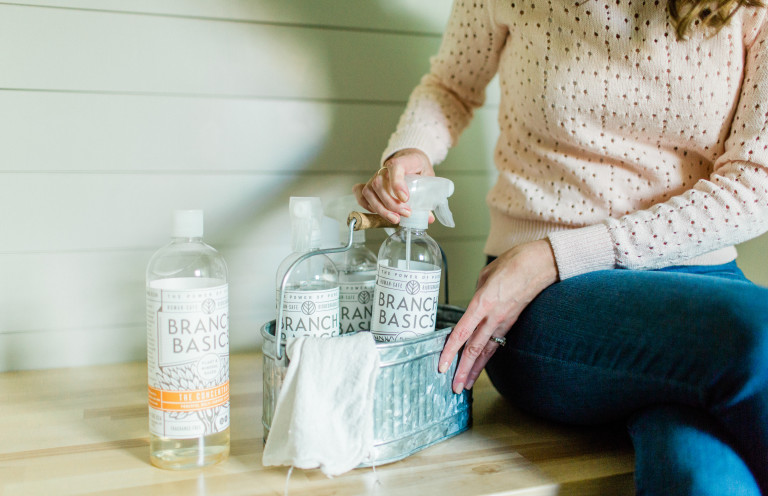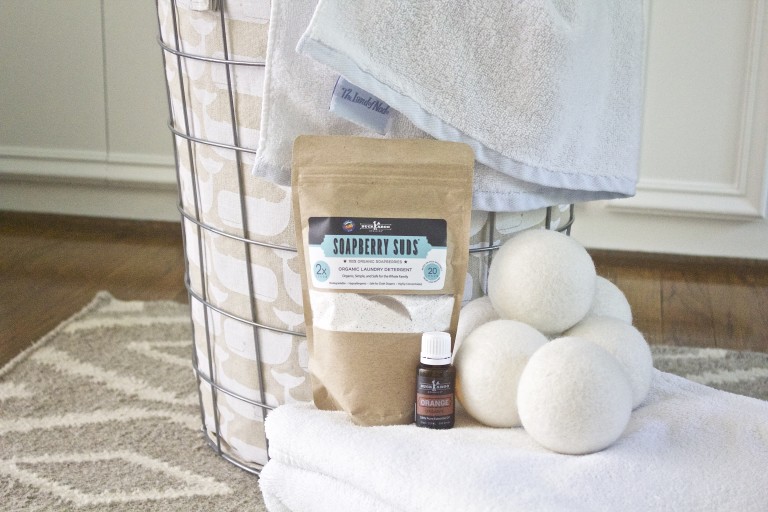Organic Lawn Care For Beginners

Whether you have small kids or pets frolicking in your yard or maybe you just want to do your part by maintaining a more eco-friendly lawn, organic lawn care is worth looking into. In the long run, an organic lawn will be more resilient and much safer for your family and the environment. This Organic Lawn Care For Beginners guide is a great place to start!
Why go organic? Herbicides and pesticides have been shown to cause everything from breathing difficulty to nerve damage and cancer. See: School children fall ill after lawn pesticides are sprayed on school property, lawn pesticides pose a significant cancer risk for dogs, Roundup (which is in the middle of several lawsuits right now) has been shown to cause miscarriages in animals, non-Hodgkins lymphoma even in people who just casually use it around their homes, and countless other risks.
Organic Lawn Care For Beginners
I’ve spent the last couple of years researching and beginning my journey into organic lawn care. By no means am I a lawn expert, but I have some great resources and helpful tips to share to hopefully give you a picture of what to expect. As always, I encourage you to dig in and do some research to find out what will work best for you and your home.
Resources:
There are a ton of websites, forums, etc. about organic lawn care out there. While I did glean some helpful tips from these, the BEST resource I’ve found is this book: The Organic Lawn Care Manual by Paul Tukey. This dude really knows what he’s talking about. He even breaks down info by region and what type of soil you have. I refer back to it often and highly recommend it to anyone headed down the organic lawn path.
Listen to my interview with Paul Tukey on the podcast
Quick Links:
Getting Started
If you’re installing a new lawn, you’re working with a clean slate which will be easier. You can ensure you have a fair amount of healthy topsoil and that you’re using the right grass seed.
If you have an existing lawn, you may need to work a little harder if you have some underlying issues. Healthy grass will crowd out weeds, so going organic means focusing on supporting your grass while naturally tackling problems that pop up.
Here are some key points for getting started with organic lawn care for beginners:
Grass Type:
Make sure you select a grass type that’s appropriate for your region, how much water it will get, and what it will be used for (just a pretty landscape or will kids be playing soccer on it?). Here is a guide by zone that also gives details on upkeep for each type.
Soil Health:
I feel like I could write a whole post just on soil! It was the missing piece for us in our backyard. It’s often underrated in lawn care, but is one of the most essential things to a healthy organic yard! The soil needs to be a living thriving ecosystem of its own to support a healthy lawn.
If you’ve been scorching your soil with synthetic nitrogen and other lawn chemicals, your soil is likely not living or thriving. Paul Tukey recommends getting your soil tested as the first step. You can use an easy test kit like this one.
Fertilizer:
Stop with the synthetics. Your lawn should work as a tiny ecosystem and taking a more holistic approach to fertilizing will help your lawn better be able to support itself long term. Compost, compost tea, organic fertilizers, and other amendments (depending on your soil test) will fertilize, add back some organic matter into the soil, and help your soil thrive. Which means less work for you down the road.
Watering:
Ideally, you want your grass to grow deep roots to be drought-resistant. Giving your lawn a heavier watering once or twice a week instead of watering daily will encourage root growth.
Mowing:
It’s recommended to mow with a very sharp blade and most resources I’ve read suggest leaving grass a bit taller (depending on grass type) to shade out weeds and conserve moisture. We have fescue and try to have it mowed no shorter than 3 inches high.
It’s also recommended to never cut more than a third of the grass height off at once. Grass clippings make an excellent fertilizer, so there’s no need to bag them unless you’ve mowed over fallen leaves (which can lead to fungus if left on the grass) or mowed over weeds that have gone to seed. Just be sure the clippings are spread evenly and not clumped up anywhere.
Weed Control:
Cornmeal gluten (like this one) is a successful pre-emergent when applied in early spring and fall. It also doubles as a fertilizer since it gives your lawn an all-natural dose of nitrogen, making it a good replacement for Weed N Feed. We’ve had great luck using it in our front yard. Some people complain that it’s not a quick fix, but over time it does work. Some helpful hints:
- Timing is everything. Like any pre-emergent, it only works when the seedlings have barely sprouted, so if you apply it too late in spring, it will not kill established weeds.
- Most studies show it works effectively over time. In the first season it controls about 58% of weeds and the next 86% and by the third year, you should see almost no weeds.
- Be sure to follow the directions. Spread it evenly with a spreader like this and be sure to lightly water it in afterward.
- It’s completely safe for children and pets immediately after applying.
For established weeds, I use Earth’s Ally Weed Killer. You can read my full review of it and the rest of their products here. This is non-selective, meaning it will also kill grass, so take care around your lawn. I’ve found it works best on a hot sunny day. Give it about 48 hours and if the weed isn’t completely dead, reapply.
Pests:
An organic lawn thrives with creatures such as earthworms and microorganisms in the soil. So you will want to avoid spraying pest controls that often don’t discriminate between the pest they’re meant to kill and everything else in your soil. Instead take the time to determine what the pest is, what might be attracting it there, and create a solution to get rid of it.
Paul Tukey recommends seeing what you can do to improve the soil or grass and make it less attractive to the pest. Put in physical controls like barriers to block the pest, use biological controls like adding in a lawn-friendly insect that will drive away the pest, or as a last resort, use a natural pesticide spray or dust. Things like neem oil, diatomaceous earth, and boric acid are examples of natural pesticides.
I didn’t even touch on the environmental impact of producing chemical fertilizers and other lawn chemicals! It’s impossible to include all of the information I want without writing a book, but hopefully, this is enough to get you started. Have a specific question I didn’t cover here? Feel free to leave it below and I’ll do my best to find an answer for you!
Also, check out how to make a pollinator-friendly backyard here!
*Some affiliate links used. All thoughts and opinions are always my own.











Hello!
Great tips!
Our backyard and outdoor area is full of mosquitoes. Any tips to keep those away? Any products or plants (citronella) that do the job?
Hi Gaby,
I haven’t come across any sprays that are non-toxic and work to keep mosquitoes away. Though a friend has several citronella plants around her porch and swears by them. She said you have to shake them and the bugs will leave them alone. I will certainly update if I find a good product for mosquitoes though!
This article was nice to read, and I found some helpful information about volcanic rock and their impact. I will use this information in my paper to educate the readers about this.
How would you suggest handling weeds this time of year? I want to get a head start with handling them this fall so
I have less to deal with when spring comes around. Any suggestions?
Hi! A few things you can do is spread corn meal gluten as a pre-emergent both fall and spring. I’d also look into natural fertilizer options to strengthen your lawn in the fall- healthy grass makes it harder for weeds. I’ve been using Sunday lawncare for fertilizer and it’s worked well. Also, The book I mention in this article is a great resource to turn to!
Thanks,
Molly
Hi, we were curious what type of weed you target with the weed preventer ? Some people consider clover a weed for example, but clover is good for butterflies and bees. Enjoyed your article and plan to buy the book you recommend.
Hi Brenda, Thanks for reading. The weed preventer is for crabgrass. -Molly